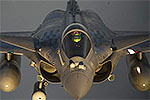Inherent Resolve Spokesman: Coalition Operations Deny ISIL’s Caliphate Dreams
 WASHINGTON, May 13, 2016 — The U.S.-led coalition fight against the Islamic State of Iraq and the Levant is denying the terrorists’ ambition to act as a state by targeting their finances, revenue sources, recruiting efforts and leaders, the Operation Inherent Resolve spokesman said today.
WASHINGTON, May 13, 2016 — The U.S.-led coalition fight against the Islamic State of Iraq and the Levant is denying the terrorists’ ambition to act as a state by targeting their finances, revenue sources, recruiting efforts and leaders, the Operation Inherent Resolve spokesman said today.
Army Col. Steve Warren briefed reporters by video teleconference live from Baghdad, beginning his remarks by welcoming an announcement by the Belgian government that beginning July 1 it would extend its counter-ISIL airstrikes into Syria.
“The additional combat power will help us more rapidly defeat our enemy,” Warren said.
Warren addressed ISIL’s 2014 announcement that it was establishing a caliphate based in an area that includes land in Iraq and Syria, with ISIL leader Abu Bakr al-Baghdadi as its Islamic steward, or caliph, and leader of all Muslims.
“ISIL's so-called caliphate relies on their ability to act like a state,” Warren said. “The fact of the matter is they can't do it. One of the reasons they can't do it is that we have put a dent in their pocketbook.”
Targeting ISIL’s Finances
Two operations target ISIL finances, he said: Operation Point Blank targets ISIL cash piles the coalition finds, and Tidal Wave II targets ISIL’s illicit oil revenue.
“The operations have had an impact,” the colonel said. “We know that ISIL's total income has been reduced substantially, and we know that their income from oil specifically has … been reduced by about 50 percent.”
ISIL’s primary source of income is what the group refers to as taxation, Warren said. “In reality, we know that it's extortion,” he added. “But even their ability to extort money from their own people continues to be reduced as our partner forces liberate more and more territory.”
The coalition also sees a reduction in the flow of foreign fighters onto the battlefield, Warren said, assessing that over the past year the number entering the combat zone each month has decreased, possibly by as much as 75 percent. He said ISIL’s failure to deliver on its promise of creating a functioning state has diminished the appeal of the so-called caliphate as a destination for foreign fighters.
“As a result, we assess that ISIL is no longer able to replenish its ranks at the rate its fighters are dying on the ground,” Warren said, noting that the decline in foreign fighters also can be attributed to coalition counter-recruitment efforts, military gains on the ground and active steps by governments to strengthen and enforce border security.
Baghdad Attacks
In response to a question about recent bombings in and around Baghdad, Warren said, “Our hearts are broken for the almost 100 Iraqi citizens who were killed or severely wounded in these recent attacks.”
The three ISIL bombings May 11 included a car bomb in Sadr City, a suicide bomber in Kadhimiya, and a bomb at a checkpoint in western Baghdad.
“We know that Baghdad is a … city of over 6 million people, and it [can’t] simply be zipped up and completely sealed off,” Warren said. “Tragically, the enemy is going to be able to get some truck bombs into the city from time to time.”
Coalition officials believe ISIL is on the defensive and back on its heels, but the terror group remains a legitimate threat and a smart, dangerous enemy, he said.
“These [Baghdad] strikes went straight into, in many cases, heavily populated Shia areas and focused on civilian women and children, … not in any way, shape or form [people who] could be considered a combatant or even a threat to ISIL in any way,” Warren said.
The bombings also were an opportunity for ISIL to gain international attention, he added.
ISIL Taking a Beating
“They have lost ground almost continuously now for half a year,” the colonel said. “They've been taking a beating, particularly in Iraq, where we've seen them lose city after city, … region after region. We've seen them lose their money [and] their leaders. We've seen them lose towns and villages and territory.”
Regarding ISIL’s threat to Baghdad, Warren reminded reporters that the combined joint task force is not involved in the defense of the city.
“Our focus right now is on training and equipping the Iraqi security forces and providing airpower in the field,” he said. “The Iraqi security forces have a plan to continue to secure Baghdad, and they're going to execute that plan. … [They] understand that they have to protect their people, and that's what they're trying to do.
“We are certainly available to provide them advice,” he continued. “We interact with them in the Baghdad Operations Center every day, and we'll continue to work with them and provide them whatever assistance we can.”